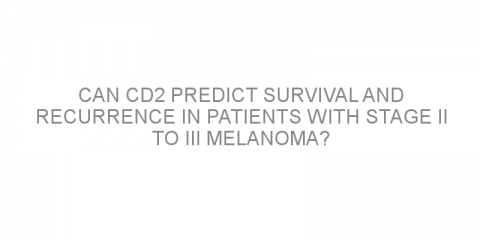In a nutshell The authors aimed to compile a review of current and emerging melanoma treatments. Some background The occurrence of cutaneous melanoma (melanoma of the skin) is increasing across the world with 160,000 new cases and 48,000 deaths occurring globally per year. UV ray exposure is one of the most common causes of melanoma and...
Read MoreCurrent stage?-Stage III Posts on Medivizor
A pill or a shot? Chemotherapy options for locally advanced non-small cell lung cancer
In a nutshell This study examined the safety and effectiveness of oral vinorelbine (Navelbine), a new form of a standard chemotherapy treatment for stage 3 non-small cell lung cancer. Some background Because symptoms of early non-small cell lung cancer can be vague, many patients are not diagnosed until their disease is locally advanced (stage 3,...
Read MoreGrapes, vegetables, and green tea: The role of nutrition in melanoma prevention
In a nutshell This review examined the role of nutrition in the prevention of melanoma. Some background Rates of melanoma have been rising, and while it’s usually curable in the early stages, once it metastasizes (spreads to other areas of the body), it is generally uncurable. Therefore, interest in preventative measures is increasing,...
Read MoreIs pretreatment with chemotherapy effective at shrinking colon tumors?
In a nutshell This study examined how effective pretreatment with chemotherapy is at shrinking colon tumors. The study also investigated how comparable internal examination and external imaging are at grading the patients’ tumor. Some background For patients with locally advanced colon cancer, preoperative chemotherapy (neoadjuvant...
Read MoreWide excision radical prostatectomy may benefit intermediate- or high-risk prostate cancer patients
In a nutshell The authors aimed to determine cancer-related and quality-of-life outcomes when treated with two different types of robot-assisted laparoscopic radical prostatectomy. Some background Robot-assisted laparoscopic radical prostatectomy (removal of the prostate) (RALP) is a robotic technique that allows accurate and careful removal...
Read MoreWhy do rectal cancer patients wait 6 weeks after chemoradiation therapy before having surgery?
In a nutshell This study summarized current data on the optimal interval between chemoradiation therapy and surgery for rectal cancer patients. Some background Locally advanced rectal cancer indicates that the cancer has spread beyond the lining of the rectum or has spread to the nearby lymph nodes. The standard treatment for low-lying locally...
Read MoreWhat is the appropriate dosage of radiotherapy for early breast cancer?
In a nutshell This paper studied the dosage of radiotherapy in women who have had surgery for early breast cancer. Some background After surgical removal of tumour, radiation is often given to prevent relapse (return of cancer). Radiation therapy can be fractionated (dividing the total radiation into smaller doses over time). Fractionation...
Read MoreDoes removing main lymph nodes improve colon cancer patient survival?
In a nutshell This study investigated whether surgical removal of the main lymph nodes improves the survival of patients with surgically curable colon cancer. Some background Surgical removal of lymph nodes is classified depending on the extent of lymph node removal. D2 dissections involve removal of the lymph nodes beside the colon and...
Read MoreNADiA ProsVue – accurate predictor of prostate cancer recurrence in radical prostatectomy patients
In a nutshell The authors aimed to determine whether their product could be used to determine prostate cancer-specific mortality and other outcomes after radical prostatectomy. Some background NADiA ProsVue is a device that determines the likelihood that a prostate cancer patient will experience recurrent cancer after receiving a radical...
Read MoreDoes race affect prostate cancer outcomes after a radical prostatectomy?
In a nutshell The authors aimed to determine whether African Americans were more at risk of experiencing recurrent prostate cancer or complications following a radical prostatectomy. Some background Past research has shown that African American men are 60% more likely to experience prostate cancer than white men. Previously, in men who...
Read MoreCan CD2 predict survival and recurrence in patients with stage II to III melanoma?
In a nutshell The authors aim was to determine whether CD2 could be a good indicator of survival in stage II to III cutaneous melanoma patients. Some background Patients with stage II or III melanoma have a survival rate that varies from 24% to 70%. This wide range of survival rates occurs as the melanoma may spread microsopically (not...
Read MoreDoes T-DM1 have a different impact on symptoms in breast cancer compared to alternative treatment?
In a nutshell This study evaluated the benefit of the new HER2-targeted therapy T-DM1 compared to an often-used alternative treatment. Some background Breast cancers expressing the human epidermal growth factor receptor 2 protein are known as HER2-positive cancer. In recent years therapies that directly target the HER2 protein, for...
Read More














